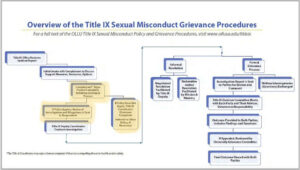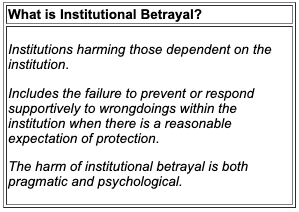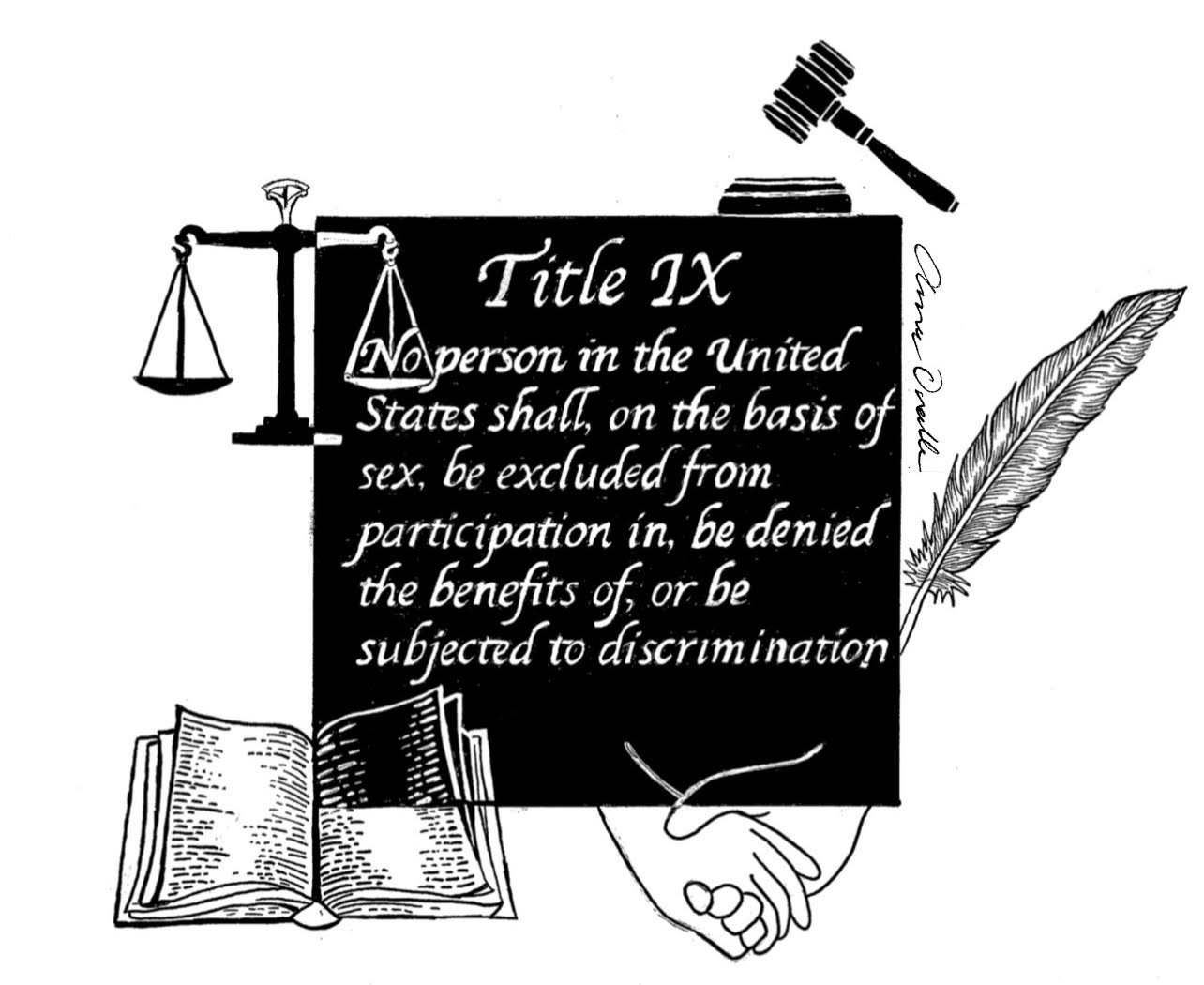Content Warning: The topic of Sexual Assault will be mentioned. Reader discretion is advised.
“So that’s it ?” I ask out loud with my laptop sitting in front of me. I had just told my incident to a Title IX practitioner over a digital call. My coordinator replies with something along the lines of “I’m sorry that we can’t help you with this incident…” – I couldn’t listen; I was too focused on how my heart felt like it was sinking into my chest. I wiped away the tears that kept streaming down my face – I didn’t know that retelling my incident would make me cry so much. Though today, I don’t want to tell you that story, I want to talk about the story after the story. Which brings us to the main question, what happens to a student after reporting to Title IX? First, we need to discuss…
What is Title IX?
Title IX is a federal law that states that: “No person in the United States shall, on the basis of sex, be excluded from participation, in be denied the benefits of, or be subjected to discrimination under any education program or activity receiving Federal financial assistance.” 1 The law was originally intended to address gender discrimination in sports but has since expanded to include all educational programs, activities or service that is federally funded. Title IX is set to protect people from gender discrimination, sexual harassment, sexual assault, and sexual violence but many offices handle a range of issues. For example, at the University of Texas at San Antonio, their office takes on issues ranging from discrimination based on protected classes including race, color, sex, religion, national origin, age, disability, citizenship, veteran status, gender identity/ expression or sexual orientation 2 Title IX law is typically a topic that’s spoken about in discussions of higher education like colleges and universities since they are federally funded. And having these systems like Title IX are so vital as 13% of all graduate and undergraduate students experience rape or sexual assault through physical force, violence, or incapacitation. 3 Additionally, college students are at a higher risk of sexual assault from the time spanning the start of the fall semester through Thanksgiving break as this is when more than 50% of all college sexual assaults are statistically found to occur 4 Through Title IX, these educational institutions have potential to really help these college students with traumatizing situations like sexual harassment, assault and more. So, what is the process like for those college students?
The Title IX Process
Generally speaking, most colleges and universities have a Title IX office that the Title IX Coordinator and other Title IX investigators operate out of or a clearly communicated reporting process. Students are eligible to report to these offices in person, over the phone as many Title IX offices offering this option, or can file a report digitally through their college’s website. Colleges typically allow the option for students to submit the digital report anonymously as well. If you’re reporting, you’ll be asked questions like your name, contact info, where the incident happened, what happened, and the list goes on. Once you report, Title IX practitioners are responsible for receiving and investigating these reports. The reports that are formally investigated have the chance to result in sanctions for the alleged perpetrator, that is if Title IX practitioners determine the alleged perpetrator is responsible for the alleged misconduct. Not all reports made to the Title IX offices will be formally investigated and adjudicated. Title IX practitioners have to determine whether the reported harassment is actionable, essentially meaning that they have to determine whether the reported incident “counts” as sexual harassment or other type of harassment and is eligible to be formally investigated. That whole section of the Title IX process, is truly a whole different article within itself but to briefly explain what constitutes as sexual harassment under Title IX, below is the exact definition that has been established Title IX Final Rule. As of August 14, 2020, the Title IX Final Rule is in effect forK-12 and colleges/universities, and in this new Title IX rule, whilst it established what educational institutions must do and are prohibited from doing, it also refines the definition of sexual harassment which is listed here:

But in short, if you felt it was wrong, report it. Report it, report it, report it. I cannot stress this enough. I don’t advise college students to look at this before you report, out of fear that this may deter you from reporting. I simply want to show this to best explain this process and the complexities of it.
And this is just the beginning of the process. To best capture how these steps are in the starting stages of the Title IX process, here is the overview of the Title IX Sexual Misconduct Grievance Procedures for college Our Lady of the Lake University (OLLU). The yellow highlighted portion of the chart, is what I’ve explained so far. Also, please note that this is OLLU’s Title IX Process so it’s not verbatim of what every Title IX process is like, for example he “Restorative Justice Resolution Facilitated by Mission & Ministry” is something personal to the university as it is a Catholic university that has a Mission and Ministry department. But this image is a great chart to explain a Title IX process is at a glimpse.

To get to the main topic of what happens after the case ends, we won’t dive into the investigation process but in short, if you are eligible, your report will be formally investigated. After the investigation, student’s will be given an outcome of the investigation and here is where another chapter begins in the survivor’s stories.
Another Chapter
Whether you go through the official Title IX process and receive formal outcome/resolution, or you weren’t eligible to go through the process, you are still left with an educational outcome. This is something researchers Cipriano, Allison E., Kathryn J. Holland, Nicole Bedera, Sarah R. Eagan, and Alex S. Diede studied among a group of graduate students. In their research, published in 2022, they conducted interviews with 32 graduate students who reported sexual harassment to their university’s Title IX office. 5 One of their goals in this study was to understand if these students had experienced any educational consequences, meaning if these experiences lead to hindering their access to education. As many of these victims had alleged perpetrators in their own department such as their advisor, a classmate, and so on, these victims were forced to see their alleged perpetrators often. Out of the 32 students interviewed , 31 had experienced severe consequences impacting their education 6 . For example, one of the graduate students, Aleena, discussed how her perpetrator was a grader in one of her classes and because of this, she felt like she was going to fail that class 7 . With her perpetrator in a position of power, it hindered Aleena’s ability to focus on what she was simply meant to do on campus, learn. Ultimately putting her at an academic disadvantage against her peers.
And another problem this study examined was the issue of students getting dismissed cases as the incidents weren’t “severe” enough. For example, for Aleena’s case, the finding was that her alleged perpetrator did not violate the student code of conduct because their action was not “severe” and that it did not interfere with her ability to benefit from her educational opportunities at her college but she states that it’s “bullshit because it definitely has very, very real repercussions” on her ability to be successful. Then we get into a whole different issue here with Title IX: can Title IX regulations on what constitutes as “severe” case, be harming students or is this a matter of Title IX offices, where Title IX investigators are dismissing cases because of their personal biases and beliefs slipping into the process? There an issue of reported behavior being deemed not actionable as sexual harassment is a huge issue because although there are rules set Title IX as to what qualifies to be taken as a case under Title IX, it has the possibility of not being properly followed by a Title IX practitioner. For example in this same study, graduate student Anne, she was told that her case didn’t qualify as sexual harassment because “it had only happened once and it needed to happen more than once in order for it to be considered really, true sexual harassment” which could lead students like Anne feeling invalidated for what they experienced.
Not only is there an educational outcome that students could experience after reaching out to their college for help, but there’s also an emotional outcome. For example, former soccer star Katie Meyer, was a peer to a first-year women’s soccer player who reported to Stanford University authorities that she had been allegedly sexually assaulted by a member of the football team the previous day.8
A week later, Katie reportedly spilled coffee on the accused football player while riding her bike. While the accusation against the college football player was never investigated in a meaningful way by Stanford officials but Katie, who explained that the coffee spill was an accident, Associate Dean Caldera filed a complaint on behalf of the football player, copying numerous other administrators in the process. Katie experienced both an educational consequence and an emotional outcome as she later fell into a deep depression following a case that had now been turned against her. Meyer even wrote that she “been scared for months that my clumsiness will ruin my chances of leaving Stanford on a good note.” which goes to show just toll of her investigation took on her mental health and the academic consequences she was facing, simply for something that she explained was an accidental coffee spill. The university warranted her disciplinary review and she was threatened with a withholding of a degree and potential removal from the university. Again, keep in mind that despite the fact that her case was over an alleged spilled cup of coffee, that the Title IX office had made the decision to not pursue her peer’s case, about this same football player for allegedly kissing a women’s soccer player without permission, further because there was not enough information to move forward. The pressure from university officials increased as a few months later she would receive a “Violation of the Fundamental Standard” email/letter which informed her that her degree would be put on hold until the matter was resolved and that, depending on the outcome, she could be removed from Stanford. She received the letter on February 28, 2022, and sadly on March 1, 2022, a few days later, Katie was found deceased in her dorm room with the letter still open on her computer. This should never be a circumstance students should be forced to chose because they reach a point of hopelessness. When students are not supported by their university, they often feel like they have no choice but to resort to these drastic options. There is a clear and direction correlation here of how much school means to these students like Katie, who was devastated at this academic opportunity of college seemingly being taken from under her. But with no proper support from the university, colleges are losing great students like Katie due to this lack of institutional help. Stanford claims that she was “offered the opportunity to have an advisor work with her and the opportunity to have someone accompany her to any meeting with OCS staff” but after all the pushback given to her from the university, as a student myself, I can understand why or if she didn’t believe they would be any use to her. Because of what she witnessed happen in her peer’s case and the lack of support, why would Katie or any other student for that matter, have reason to believe that they would be supportive toward’s Katie’s case?
Despite working for the university, representing them through soccer games and being a 3.8 GPA college student, Katie Meyer was not given the same care from the university that she gave to the university by being an active member of that campus. As it turns out, this is a phenomenon and it has a name : “Institutional Betrayal”. The term institutional betrayal was coined by Jennifer J. Freyd, PhD, a professor Emeritus of Psychology at the University of Oregon and a researcher among many other titles. It refers to the “wrongdoings perpetrated by an institution upon individuals dependent on that institution, including failure to prevent or respond supportively to wrongdoings by individuals (e.g. sexual assault) committed within the context of the institution.” 9 The first use of the term can be traced back to a presentations by Freyd in early 2008 where she connected with betrayal trauma theory which is a theory that “predicts that the degree to which a negative event represents a betrayal by a trusted needed other will influence the way in which that events is processed and remembered” 10 Essentially, the term refers to the concept that when people who depend on an institution for safety and well-being, are not given that trust and safety by said institution, they feel betrayed. This institutional betrayal can also lead to things like leaving their university all together. In another study done by the organization “Know Your Title IX”, in the more than 100 student survivors who formally reported sexual violence to their schools, they found that 39 percent of survivors who reported sexual violence to their schools experienced a substantial disruption in their educations. To break this data down more, 27 percent of survivors who reported took a leave of absence, 20 percent transferred schools, and nearly 10 percent dropped out of school all together 11 … and this is exactly what I had to do.
What is it like After Title IX?
Why I chose St. Mary’s University and why I am a here at St. Mary’s are two different reasons, though for the average student, these two go hand in hand. Why I chose St.Mary’s University is because I have hopes to be in the legal field one day and I was very drawn to having access to the pre-law resources here. But the reason that I’m here, is actually because I had to flee my last college I was attending. Flee may seem like a dramatic word to use but attending a new college where you don’t live in fear of running into your perpetrator, makes any new college feel like a safe haven.
So what’s it like ? For me, it was hard. I was left feeling like I was the only one that was rejected by this system. I had start over at a whole new school, leaving behind old college friends, great mentorships with professors, and so on. Even as I type this, I get emotional describing just how much I genuinely loved this campus. Most of all, it hurt because it was home, at least that’s what it used to feel like. Now, it’s all tainted by the issue that I wasn’t properly supported. After all the years I gave to the college…all the tuition, love, time, and dedication, I felt like I was loving to a college that in turn didn’t love me back. Out of hurt of this betrayal combined with the fear for my safety, I did the only choice I felt I had left, which was to leave.

In truth, I find it hard to wrap up this article with ending on a “good” note as this is such a hard topic to discuss. But at the very minimum, it’s important that administrators, faculty, staff, and Title IX coordinators have insight into what a college student’s Title IX experience can be like. There is a need to consider institutional betrayal when working with students involved in this process. It’s important to make unbiased counseling resources available for all parties involved in the process. Though I’m in very beginning stages of my career, I know that one day my experience can help institute change in the Title IX system whether that be locally or changing policy at the national level. And as for my story, I want to clarify that though I feel betrayed by my past college, I don’t want to write it off as a terrible college. My old college was comforting to me, it was like a green tea with lemon and honey in it, warm with sweetness and a little tang. Even now, if you ask me about this college, I still speak of it very kindly. I will mention how the students are some of the nicest students you will ever meet. I would also say that they are some of the most community oriented people that I have ever met, ensuring that we all rise up the ladder together. I will say that they have some professors who are so great, you feel like you don’t deserve them. And once you meet them, they are so passionate about their field, you will forever want that profession to be your major. I will say that the campus is so beautiful, you would want to eat outside everyday just to get a view of the scenery.
But like all tea with freshly squeezed lemon in it, you sometimes get bad seeds. That doesn’t mean the tea is bad, I just couldn’t swallow the seeds anymore.
- “Title IX and Sex Discrimination.” Policy Guidance. US Department of Education (ED), August 20, 2021. https://www2.ed.gov/about/offices/list/ocr/docs/tix_dis.html. ↵
- UTSA’s Title IX 2019-2020 Fiscal Year Annual Report , pg.3 https://www.utsa.edu/eos/docs/2019-20-TitleIX-Annual-Report.pdf ↵
- David Cantor, Bonnie Fisher, Susan Chibnall, Reanna Townsend, et. al. Association of American Universities (AAU), Report on the AAU Campus Climate Survey on Sexual Assault and Sexual Misconduct (January 17, 2020). (“Victim services agency” is defined in this study as a “public or privately funded organization that provides victims with support and services to aid their recovery, offer protection, guide them through the criminal justice process, and assist with obtaining restitution.” RAINN presents this data for educational purposes only, and strongly recommends using the citations to review any and all sources for more information and detail. ↵
- Bauer-Wolf, Jeremy. “Avoiding the Red Zone.” Inside Higher Ed. Accessed May 11, 2023. https://www.insidehighered.com/news/2019/09/12/experts-say-new-methods-needed-combat-red-zone-campuses. ↵
- Cipriano, Allison E., Kathryn J. Holland, Nicole Bedera, Sarah R. Eagan, and Alex S. Diede. 2022. “Severe and Pervasive? Consequences of Sexual Harassment for Graduate Students and Their Title IX Report Outcomes.” Feminist Criminology 17 (3): 343–67. https://doi.org/10.1177/15570851211062579. ↵
- Cipriano, Allison E., Kathryn J. Holland, Nicole Bedera, Sarah R. Eagan, and Alex S. Diede. 2022. “Severe and Pervasive? Consequences of Sexual Harassment for Graduate Students and Their Title IX Report Outcomes.” Feminist Criminology 17 (3): 343–67., Pg.8, Table 1 https://doi.org/10.1177/15570851211062579. ↵
- Cipriano, Allison E., Kathryn J. Holland, Nicole Bedera, Sarah R. Eagan, and Alex S. Diede. 2022. “Severe and Pervasive? Consequences of Sexual Harassment for Graduate Students and Their Title IX Report Outcomes.” Feminist Criminology 17 (3): 343–67. pg.8 https://doi.org/10.1177/15570851211062579. ↵
- “Stanford University Accused in Wrongful Death Lawsuit Brought by Parents of Former Soccer Star Katie Meyer | Sports Litigation Alert.” Accessed May 11, 2023. https://sportslitigationalert.com/stanford-university-accused-in-wrongful-death-lawsuit-brought-by-parents-of-former-soccer-star-katie-meyer/. ↵
- https://dynamic.uoregon.edu/jjf/institutionalbetrayal/index.html#introduce ↵
- From Sivers, Schooler, & Freyd (2002) https://dynamic.uoregon.edu/jjf/articles/recoveredmemories.pdf ↵
- https://knowyourix.org/wp-content/uploads/2021/03/Know-Your-IX-2021-Report-Final-Copy.pdf ↵



2 comments
Sudura Zakir
In this piece of writing, it is really clear that considerable work was put into it. The reader can simply follow the portions because they were organized into clear, short sections. The article’s subject matter is one that is of great current importance. Although the phrase “Title IX” is frequently heard, few people are familiar with what it refers to and what it is meant to safeguard. The history and definition of Title IX are provided in this article. really fascinating and educational. Awesome
Andrew Ponce
Hello Anna! This article is one where it is very easy to tell how much effort went into it. The sections that were subdivided into sections that are clear and concise for the reader to easily follow through. The topic of the article itself is one that is very prominent for this modern time. Many people hear the term “Title IX”; however, not many people understand what it means and what it is supposed to protect. This article lays out the definition and the history of Title IX. Very informative and interesting. Great work!